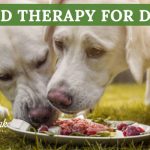
Eastern food therapy for dogs is a hopeful option to ensure the well-being of our dogs. It is vital for responsible pet ownership, highlighting the importance of their general health and happiness. As devoted pet owners, we are always looking for practical ways to improve the quality of life for our furry companions. Grounded in age-old practices, this method nourishes our canine pals through thoughtful dietary selections. Let’s delve into Eastern Food Therapy and investigate three convincing reasons why it could be a valuable inclusion in your dog’s overall wellness routine.
Understanding Eastern Food Therapy for Dogs
 Eastern Food Therapy for dogs follows fundamental principles steeped in traditional wisdom. Its core belief is that a well-adjusted and customized diet can positively impact a dog’s health. The focal point is recognizing food as a tool to foster balance and harmony within the canine body.
Eastern Food Therapy for dogs follows fundamental principles steeped in traditional wisdom. Its core belief is that a well-adjusted and customized diet can positively impact a dog’s health. The focal point is recognizing food as a tool to foster balance and harmony within the canine body.
Diverging from Western methods, Eastern Food Therapy for dogs emphasizes comprehensive and personalized nutrition. Unlike standard diets, Eastern principles consider each dog’s unique makeup, concentrating on specific dietary tweaks tailored to individual health requirements.
Regarding dog well-being, Eastern Food Therapy introduces unique perspectives, acknowledging the interconnected nature of physical and energetic elements. It advocates for a harmonious equilibrium between nutrition and a dog’s natural energy flow, contributing to overall vitality and resilience.
Incorporating Eastern Food Therapy
Eastern Food Therapy for dogs aims to enhance overall canine health by prioritizing optimizing their well-being. This method adopts a comprehensive approach, nurturing a dog’s health by considering physical and emotional aspects. The primary goal of incorporating Eastern Food Therapy for dogs is to address specific health concerns—this dietary approach tailors strategies to target individual health issues, providing a personalized solution beyond one-size-fits-all approaches.
Fundamentally, Eastern Food Therapy for dogs focuses on promoting holistic well-being for dogs. Recognizing the interconnected nature of a dog’s health, this approach endeavors to establish a harmonious balance between physical and emotional aspects, contributing to the overall quality of a dog’s life.
 Adopting Eastern Food Therapy for dogs brings numerous benefits to our canine companions. From improved digestion to heightened energy levels, this approach offers a holistic enhancement to a dog’s health. The personalized nature of this dietary strategy ensures that individual needs are met, fostering a profound sense of well-being that surpasses conventional canine nutrition methods. Pet owners actively contribute to their beloved furry friends’ long-term health and happiness by incorporating Eastern Food Therapy for dogs.
Adopting Eastern Food Therapy for dogs brings numerous benefits to our canine companions. From improved digestion to heightened energy levels, this approach offers a holistic enhancement to a dog’s health. The personalized nature of this dietary strategy ensures that individual needs are met, fostering a profound sense of well-being that surpasses conventional canine nutrition methods. Pet owners actively contribute to their beloved furry friends’ long-term health and happiness by incorporating Eastern Food Therapy for dogs.
Recommended Foods in Eastern Food Therapy
 In Eastern Food Therapy for dogs, certain ingredients take precedence in fostering canine well-being. These recommended foods consist of diverse elements thoughtfully chosen for their potential health benefits. From lean proteins to nutrient-rich vegetables, the focus lies in selecting ingredients that contribute positively to a dog’s overall health.
In Eastern Food Therapy for dogs, certain ingredients take precedence in fostering canine well-being. These recommended foods consist of diverse elements thoughtfully chosen for their potential health benefits. From lean proteins to nutrient-rich vegetables, the focus lies in selecting ingredients that contribute positively to a dog’s overall health.
Preparation methods hold immense importance in Eastern Food Therapy for dogs. Beyond the specific ingredient choices, the method of preparing these foods plays a pivotal role in safeguarding their nutritional value. Preferred cooking methods that retain essential nutrients ensure that the recommended foods deliver maximum health benefits for our furry companions.
Eastern Food Therapy for dogs goes beyond specifying particular foods and imparts valuable nutritional insights. Grasping the nutritional composition of recommended foods is imperative for pet owners aiming to optimize their dog’s well-being. By acquiring insights into the essential nutrients offered by these foods, pet owners can make informed decisions, customizing their dog’s diet to meet individual health needs. Embracing Eastern Food Therapy for dogs grants pet owners a holistic approach to canine nutrition, fostering overall health and longevity for their cherished pets.
Potential Risks and Concerns
Exploring Eastern Food Therapy for dogs requires recognizing potential risks linked with this method. Like any wellness strategy, there are factors demanding attention to guarantee the safety and health of our canine companions.
Understanding the risks related to this therapy involves acknowledging that individual dogs may respond differently to specific foods. Allergies, sensitivities, or existing health conditions can impact how a dog reacts to dietary changes. Responsible implementation of Eastern Food Therapy for dogs involves vigilant observation and gradual introduction of new foods to monitor potential adverse reactions.
 Ensuring responsible implementation is crucial in minimizing potential risks. Pet owners should consult a veterinarian trained in Eastern Food Therapy (like Dr. Damron) before adopting an Eastern Food Therapy routine for their dogs. Professional guidance ensures a customized approach aligned with each dog’s unique health needs, reducing risks and maximizing potential benefits.
Ensuring responsible implementation is crucial in minimizing potential risks. Pet owners should consult a veterinarian trained in Eastern Food Therapy (like Dr. Damron) before adopting an Eastern Food Therapy routine for their dogs. Professional guidance ensures a customized approach aligned with each dog’s unique health needs, reducing risks and maximizing potential benefits.
By addressing safety concerns, understanding associated risks, and ensuring responsible implementation, pet owners can navigate Eastern Food Therapy for dogs confidently and attentively. It is a valuable approach that, when approached thoughtfully, can positively contribute to the overall well-being of our cherished canine companions. As with any health-related decision for our pets, knowledge, caution, and professional guidance are essential in fostering a secure and effective wellness journey.
Three Alluring Reasons to Embrace Eastern Food Therapy
Enhancing Canine Vitality
A persuasive reason to consider Eastern Food Therapy for dogs is its ability to improve their health and energy levels. This method focuses on using specific foods with therapeutic properties to address various health concerns and boost the vitality of our furry friends. By including appropriate ingredients in their diet, pet owners may observe positive changes in their dogs’ well-being, promoting a healthier and more energetic lifestyle.
This aspect of Eastern Food Therapy aligns to nurture a strong and thriving canine companion. Eastern Food Therapy offers a valuable path for pet owners in the quest for canine well-being. Its emphasis on straightforward yet purposeful dietary choices can significantly contribute to the overall health of dogs, making it an appealing option for those looking to enhance their pets’ vitality.
Tailoring Nutrition to Individual Needs
 For those caring for dogs, exploring Eastern Food Therapy unveils three strong reasons to embrace this holistic method. One significant factor is the customization of nutrition to suit individual needs. Eastern Food Therapy for dogs distinguishes itself through personalized dietary approaches. Recognizing each dog’s uniqueness and specific nutritional demands, this method tailors the diet accordingly. This allows pet owners to offer their canine companions a more personalized, efficient, and healthy approach. This focus on individualized dietary choices corresponds with the fundamental principles of Eastern Food Therapy, providing a modest yet potent means to improve the overall health of our cherished pets.
For those caring for dogs, exploring Eastern Food Therapy unveils three strong reasons to embrace this holistic method. One significant factor is the customization of nutrition to suit individual needs. Eastern Food Therapy for dogs distinguishes itself through personalized dietary approaches. Recognizing each dog’s uniqueness and specific nutritional demands, this method tailors the diet accordingly. This allows pet owners to offer their canine companions a more personalized, efficient, and healthy approach. This focus on individualized dietary choices corresponds with the fundamental principles of Eastern Food Therapy, providing a modest yet potent means to improve the overall health of our cherished pets.
Holistic Well-being
For pet owners considering Eastern Food Therapy for dogs, there are three compelling reasons to welcome this holistic approach. One noteworthy aspect is its emphasis on achieving holistic well-being. Eastern Food Therapy for dogs uniquely concentrates on overall mental and physical health. This approach recognizes the interconnectedness of a dog’s psychological and physical state, aiming to promote balance and harmony. By incorporating suitable foods into their diet, pet owners may observe positive effects on their dogs’ mental alertness and physical vitality. This holistic focus aligns with the principles of Eastern Food Therapy, offering a simple yet effective avenue to enhance the overall well-being of our canine companions.
Eastern Food Therapy for dogs improves overall vitality by using specific foods with therapeutic properties, boosting health and energy levels. Customizing nutrition focusing on each dog’s unique needs ensures an effective nutritional strategy. The critical feature of Eastern Food Therapy is tailoring nutrition to individual needs and recognizing the distinct requirements of every dog. This straightforward focus aligns with the core principles of Eastern Food Therapy, offering a solid way to enhance the well-being of our cherished pets.
Eastern Food Therapy targets mental and physical health to promote holistic well-being, aiming for a harmonious balance. Including suitable foods in their diet may positively impact dogs’ mental alertness and physical vitality. For responsible pet owners, prioritizing our dogs’ well-being is crucial. Choosing Eastern Food Therapy for canine wellness is a thoughtful decision considering the numerous benefits. The simplicity of its principles, coupled with a significant impact on a dog’s overall health, makes it an appealing option for holistic pet care.
 Explore the potential of Eastern Food Therapy for your furry companions. For comprehensive and integrative care, consider White Oak Animal Hospital. With over 28 years of experience and a commitment to the well-being of over 6,000 pets, Dr. Casey Damron and the team provide excellent care. To schedule an appointment or inquire about TCVM Telemedicine consultations, visit White Oak Animal Hospital. Your pet’s health and happiness are our priority.
Explore the potential of Eastern Food Therapy for your furry companions. For comprehensive and integrative care, consider White Oak Animal Hospital. With over 28 years of experience and a commitment to the well-being of over 6,000 pets, Dr. Casey Damron and the team provide excellent care. To schedule an appointment or inquire about TCVM Telemedicine consultations, visit White Oak Animal Hospital. Your pet’s health and happiness are our priority.
Related Posts
-
Why Try Food Therapy For Dogs?
Have you heard of food therapy for dogs? PET | TAO, a premium holistic pet…
-
Food Therapy for Cats
Could your feline benefit from food therapy for cats? Yes! In fact, you can help…
-
Discover Health Solutions For Your Pet with a Food Therapy Consultation
A food therapy consultation for your pet may be the key to uncovering their optimal…
-
5 Benefits Of Feeding Freeze Dried Dog Food
Compared to freeze dried dog food, home cooking is time-intensive. Furthermore, if you want to…









